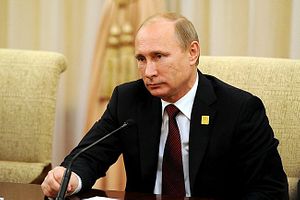Russian President Vladimir Putin has explicitly outlined a deterministic view of his country, as noted by Ingmar Oldberg in “Russia’s Great Power Ambitions and Policy under Putin”:
“Russia was and will remain a great power, preconditioned by the inseparable characteristics of its geopolitical, economic and cultural existence.”
Indeed, thinkers such as Robert Kagan have stated that the contemporary status of Russia is one where “history has most dramatically returned,” referring to the breakdown of the supposed U.S.-backed liberal-democratic world order. Interestingly, Kagan also makes the curious observation that the “recrimination” felt by a Russia that was defeated in the Cold War is akin to the sentiments of a post-Versailles Weimar Germany. That analogy may be questionable, but the issue of revanchism is an important one. However, we must also consider it in terms of culture and public consciousness, which are often ignored within the formulation of policy and national self-perception but can be seen as significant factors underpinning Russian foreign policy.
Even if Russia considered itself a great power before the end of the Cold War, realist thinking would dictate that this bears little to no relevance on the problems it faces in the contemporary world. Nonetheless, analyses of Russia need to focus in particular on the keen historical awareness that continues to be apparent in its foreign policy imperatives. The particular circumstance in which this “historicity” shows itself in certain countries is defined by Henrik Larsen:
“Faced with uncertainty or lack of information or when leadership lacks clearly defined preferences for the outcome of a crisis, historical experience is likely to play a role in the formulation of foreign policy.”
This arises from a “constructivist” understanding of nationalism, in which there is nothing truly innate within a nation that serves to define it as a great power, but instead it is an interplay of “cultural signs and symbols” that operate within a national discourse and are subject to “continuous political redefinition.” Rich’s account of this in “Russia as a Great Power” specifically goes a step further and claims that throughout the Cold War, Russia “postured as a superpower” and that even throughout its Tsarist history, it was seen as operating on a different understanding of power than the West was, being more akin to the Ottoman Empire in its nature. While this does not mean that Russia was necessarily inferior militarily, there has been a certain distinctness to Russian power which has had trouble fitting in with the Western understanding. Indeed, the 2008 Russian-Georgian war has stood out as a notable problem for proponents of the democratic peace theory.
Rich’s view can be seen to be related to the notion of “national messianism” or the “Third Rome” mentality that defines Russian thinking. This messianism can be both religious Slavophilism as well as secular and revolutionary. It is defined by a focus on the fact that Russia has a unique history in being neither fully European nor fully Asian and having a “peculiar historical development” compared to the rest of the world, as noted by Janko Lavrin in “Populists and Slavophiles.” Curiously, there does seem to be a spiritual link between the peasant commune revered by nineteenth-century authors and the post-1918 socialism that can be attributed to some distinctly Russian character, as Vatro Murvar explains in “Messianism in Russia: religious and revolutionary.” Murvar quotes Konstantin Leontiev, who outlined his vision of the Russian historical niche as:
“I believed before and still believe that the Russia which is to head some new Eastern realm will give to the world also a new culture, so that the Slav-Oriental civilization may replace the passing civilization of Latin-Germanic Europe.”
This view stands in stark contrast to the brand of historical exceptionalism rooted in the U.S. Constitution or the French Revolution. Indeed, the peculiar spiritual understanding of the fate of the Russian person is described by that most Russian of Russian authors, Dostoyevsky, as quoted by Nancy Ries in Russian Talk:
“It seems that the narod (people) has been infected with this thirst for suffering since the beginning of time. This stream of suffering runs through all its history, not only summoned by external misfortune and poverty, but welling up like a spring from the very heart of the people.”
It is important to bear this in mind when attempting to contextualize Russia in contemporary international norms. It may seem hardly relevant to cover the intellectual history of Russian exceptionalism, but it is an important facet for understanding how the nation considers itself as partaking in a unique destiny and that its special status is necessarily conjoined with elements of, not necessarily freedom and prosperity, but suffering and power. As such, an analysis that anticipates a fatalistic, economics-based interpretation of a Russia delegated to the historical sidelines misses an important cultural factor that drives the country’s continued insistence on trying to punch above its weight.
Kirill Kovalenko is a Masters of International Relations graduate from the University of Melbourne interning with the Royal United Services Institute of Victoria.

































